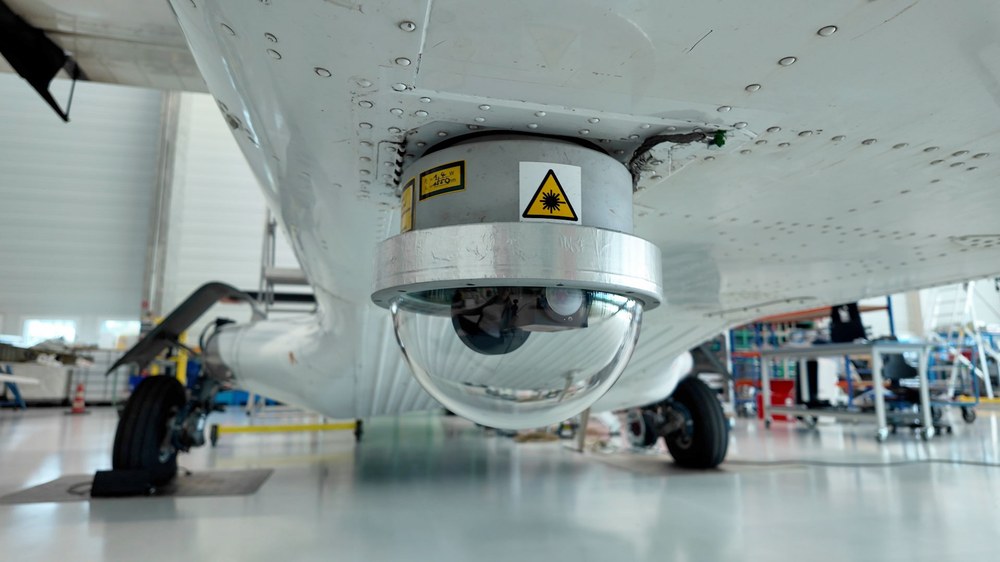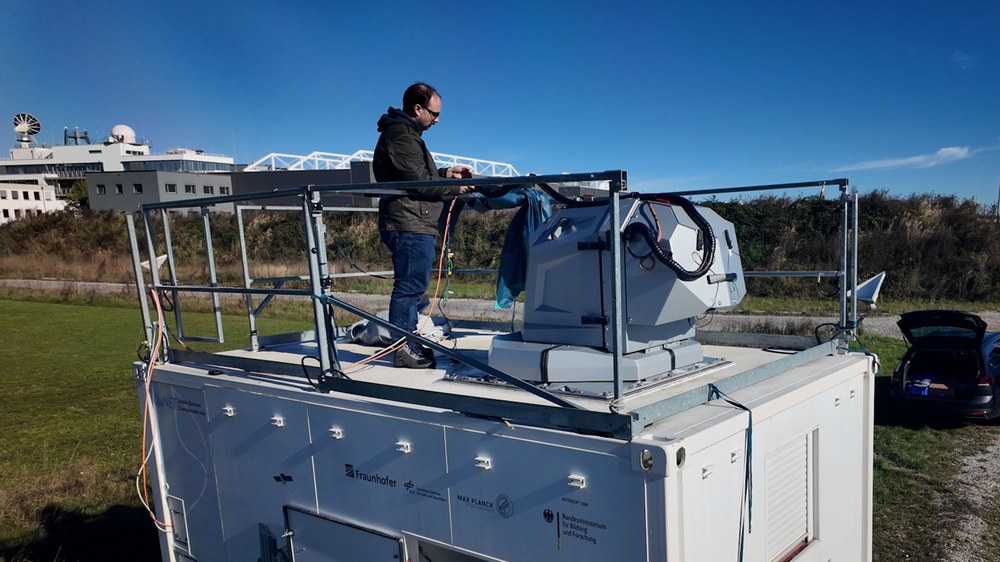Federal Chancellor Friedrich Merz visits Fraunhofer IOF
During his visit to the Fraunhofer Institute for Applied Optics and Precision Engineering IOF in Jena, Federal Chancellor Friedrich Merz saw for himself Germany’s high technological standard in quantum research. The focus was not only on photonic quantum computers, but also on the nationwide flagship project QuNET. With this project, Germany is researching the fundamentals for highly secure quantum communication of the future – all under the motto ‘Made in Thuringia’.
During a tour of the laboratories, the Chancellor was given an overview of the latest developments in the project. Fraunhofer IOF researchers demonstrated how quantum channels to mobile platforms such as aeroplanes have already been successfully implemented in the QuNET project and how the new optical ground station in Jena is now preparing the next step towards satellite-based quantum communication. In addition to a location in Oberpfaffenhofen, the ground station is one of the first of its kind in Germany and forms a key building block for future global quantum networks.
The visit underscores the relevance of QuNET for Germany as a centre of business and innovation. Quantum communication will not only help to protect critical infrastructure such as government networks, the financial sector and healthcare, but will also open up new value chains for high-tech companies. The close cooperation between the federal and state governments, science and industry, which is exemplified in Jena, is making Thuringia and Germany a driving force in the international competition for the most secure next-generation communication systems.

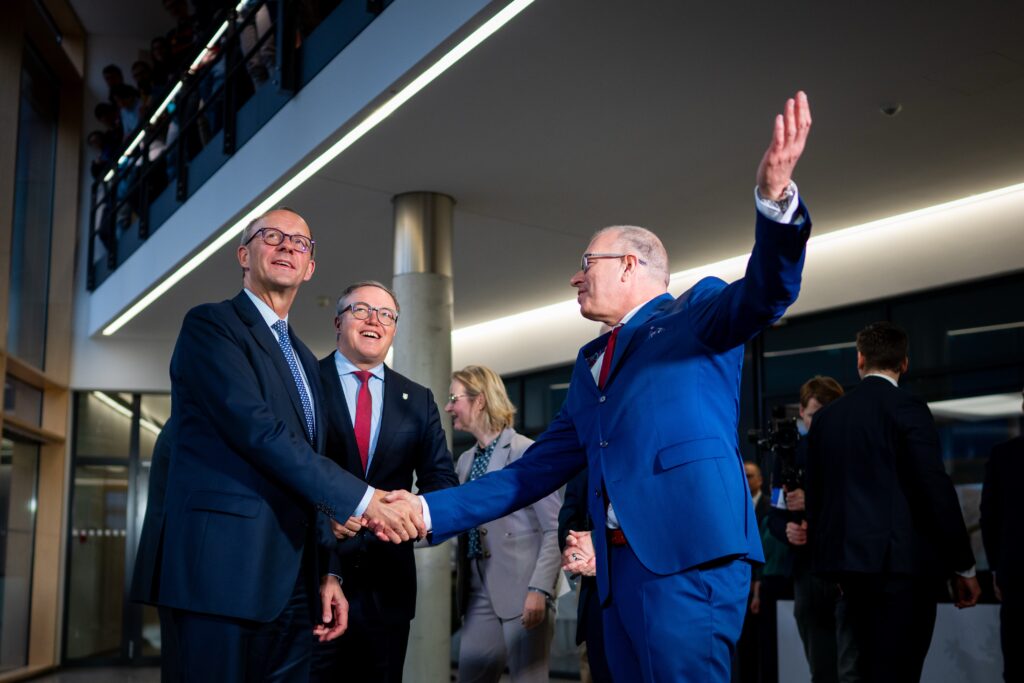
Max Planck Institute for the Physics of Light in Erlangen to host QuNET General Assembly in 2025
MPL hosted the QuNET General Assembly on 22 and 23 October 2025. This two-day event brought together partners from the initiative’s science and research departments to discuss current project developments, as well as the challenges and opportunities of further joint design.
Following welcome addresses from Prof. Dr. Christoph Marquardt (MPL/FAU) and Prof. Dr. Andreas Tünnermann (Fraunhofer IOF), Dr. Felix Wissel (Deutsche Telekom AG) presented participants with the current issues facing the initiative’s advisory board. A highlight of the meeting was the presentation of the initial impressions and results of Key Experiment 3, which had been successfully completed just a few days earlier. The meeting also focused on planning the final major experiment, SE4, which will connect the regional domains of the QuNET initiative in a joint demonstration across federal states next year.
In addition to gaining further insights into the ongoing QuNET+ projects, which were presented during a speed session, attendees were able to participate in a laboratory tour at the Max Planck Institute and visit its state-of-the-art research facilities. These experiments form part of QuNET’s ongoing efforts to develop innovative solutions to the challenges of quantum communication and advance technological progress in this field.
Further information is available here.
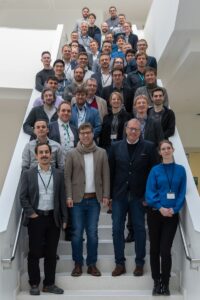
A milestone in quantum communication: successful demonstration of flying quantum channels
Researchers at the Fraunhofer Institute for Applied Optics and Precision Engineering IOF and the German Aerospace Centre (DLR), together with partners in the QuNET initiative, have successfully completed a groundbreaking experiment: For the first time, quantum states were transmitted via a mobile air node, a research aircraft, to a ground station, where they were detected. This key experiment marks a decisive step towards a future secure quantum communication network.
The so-called ‘Key Experiment 3’ demonstrated that an aircraft can function as an active node in a quantum network. It was possible to transmit photons in a targeted manner between a flying transmitter and a mobile ground station and then feed them into an ion trap. The results impressively demonstrate the technical feasibility of airborne and satellite-based quantum communication, a key technology for a future global quantum internet and highly secure data networks. For the experiment, an optical communication terminal was integrated into a DLR Dornier 228 research aircraft, which served as a mobile transmitter during the flight. The receiving station was located in a specially equipped container, known as QuBUS, belonging to Fraunhofer IOF, which received the quantum information on the ground. Thanks to high-precision beam tracking and adaptive optics, it was possible to establish a stable optical connection between the aircraft and the ground despite atmospheric turbulence. Quantum channels were successfully established on multiple occasions, and photons were transmitted over several kilometres.
With the successful demonstration of flying quantum channels, the researchers have laid an important foundation for the development of quantum-secure communication networks. The findings will form the basis for future pilot projects in which air, ground and satellite stations will be connected to form a global, resilient quantum network, paving the way for the communication age of the future.
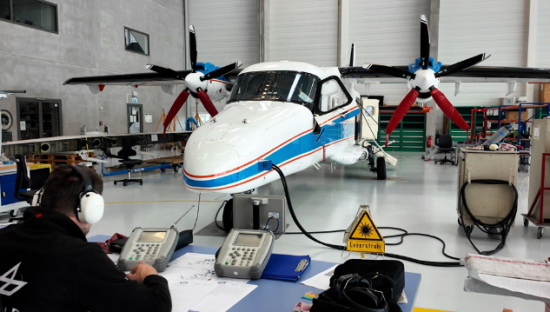
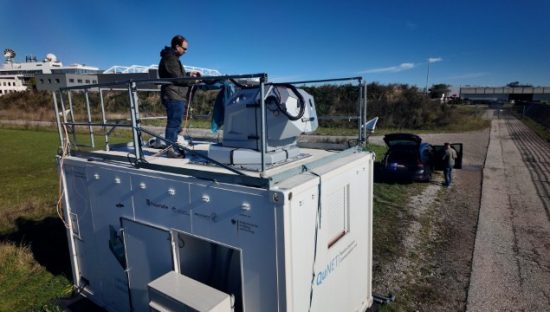
Recap of the second QPIH workshop: Terrestrial Quantum Networks
On 11 September, the second workshop of the Quantum Innovation Hub (QPIH) took place at Fraunhofer IOF. This event brought together experts from science and industry to discuss current developments and challenges in the field of terrestrial quantum networks. The workshop provided a platform for the exchange of knowledge and the promotion of innovation in quantum communication.
The event was opened by Professor Fabian Steinlechner (IOF/FSU), followed by a thematic introduction by Dr Thorsten Goebel (IOF). During the workshop, current research advances and technologies in the field of terrestrial quantum communication networks were presented. These presentations stimulated in-depth discussions and were supplemented by specialist lectures by Dr Kevin Füchsel (Quantum Optics Jena), Dr Falk Eilenberger (IOF) and Dr Matthias Goy (IOF).
A special highlight of the event were the lab tours, which gave participants an exclusive insight into applied quantum research. In addition, a poster and exhibit exhibition promoted the exchange of ideas and results among those present. The event concluded with a World Café, which had already been successfully held in the prior workshop. Participants were divided into smaller groups, where they spent eight minutes brainstorming intensively on specific topics such as ‘Packaging and Integrated Photonics,’ ‘Network Integration and Heterogeneous Architecture,’ and ‘Advanced Fibre Technology’ and exchanged their perspectives.
The event thus not only offered valuable insights into the state of quantum communication, but also provided an opportunity for networking and promoting interdisciplinary collaboration, which is crucial for the further development of terrestrial quantum communication networks.


Recap of the QuNET initiative at the World of Quantum 2025
Last week, the QuNET initiative had its own stand at this year’s World of Quantum in Munich.
A quantum key distribution system (QKD) was presented, which illustrates the research results to date in the field of QKD. The system clearly demonstrates the principles of data encryption and the importance of keeping keys secret. In addition, 3D models of free-space communication and a polarisation compensation unit were presented. Other exhibits illustrating the technological development of quantum hardware were also presented during the event. The exhibition stimulated numerous discussions with interested representatives from industry, applications and science.
A particular highlight was the Quantum Safe Communication application panel. The presentations from representatives of the European Commission to large-scale industry, from research to application, offered many exciting insights into quantum safe communication. Prof Andreas Tünnermann, project manager of the QuNET initiative and head of the Fraunhofer IOF, moderated the event. He was supported by Dr Bettina Heim from OHB System and Dr Felix Wissel from Deutsche Telekom. Together, they visualised a storyline based on technological developments and industry perspectives.
QuNET’s research activities focus on the field of quantum QKD (quantum cryptography). In quantum cryptography (QKD), keys for data encryption are generated and transmitted using light and the laws of quantum mechanics. This technology enables the immediate detection of eavesdropping attempts and interrupts the secure channel.
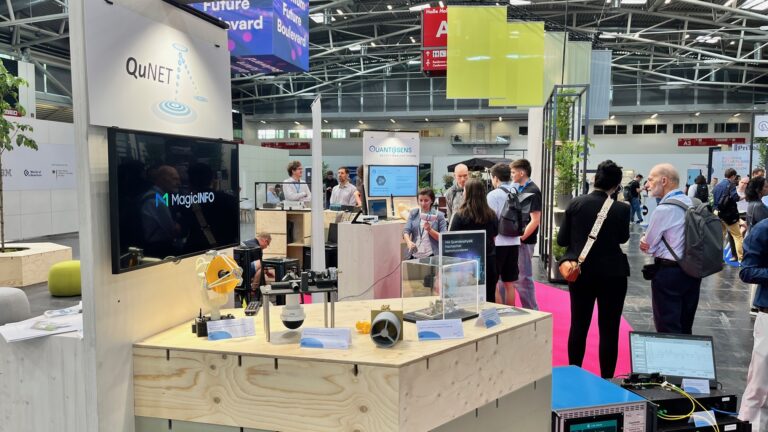
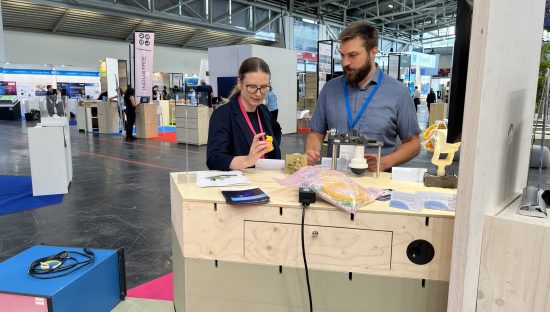
Recap of the QuNET Industry Workshop on ‘Transfer of Quantum Communication Technologies for Germanys Technological Sovereignty‘
On 11 June 2025, the QuNET initiative held an industry workshop at the Fraunhofer Heinrich Hertz Institute (HHI) in Berlin. As a partner in the QuNET core consortium, the HHI took on the role of host and thus provided a suitable setting for organising the workshop. Around 100 participants – including 55 representatives from industry – came together to discuss current developments and fields of application for quantum-safe communication.
In his welcoming address, State Secretary Dr Rolf-Dieter Jungk from the Federal Ministry of Research, Technology and Space (BMFTR) spoke about the relevance of quantum communication for the digital future and then kicked off a live demonstration, which was part of the event and illustrated a practical application of quantum communication technologies in an industrial environment. Dr Jungk also took part in the subsequent panel discussion and discussed the political and economic framework conditions for technology transfer.
Other programme items at the event included an industry exhibition and an industry slam followed by a world café. Kiosks with exhibits and posters offered diverse insights into the ecosystem of quantum communication technologies in Germany and opened up opportunities for networking and discussion.
A joint exhibit of the QuNET initiative was presented at the event. The centrepiece of this exhibit is a mockup of a Quantum Key Distribution (QKD) system. QKD data obtained in the laboratory is visualised and then the principle of data encryption and the importance of keeping the keys secret are explained in a playful way. In addition, further exhibits were presented which illustrate the technological development of quantum hardware.
For further information: Press release of Fraunhofer HHI, 12.06.2025 – Industry workshop of the QuNET initiative: Highly secure communication through quantum physics
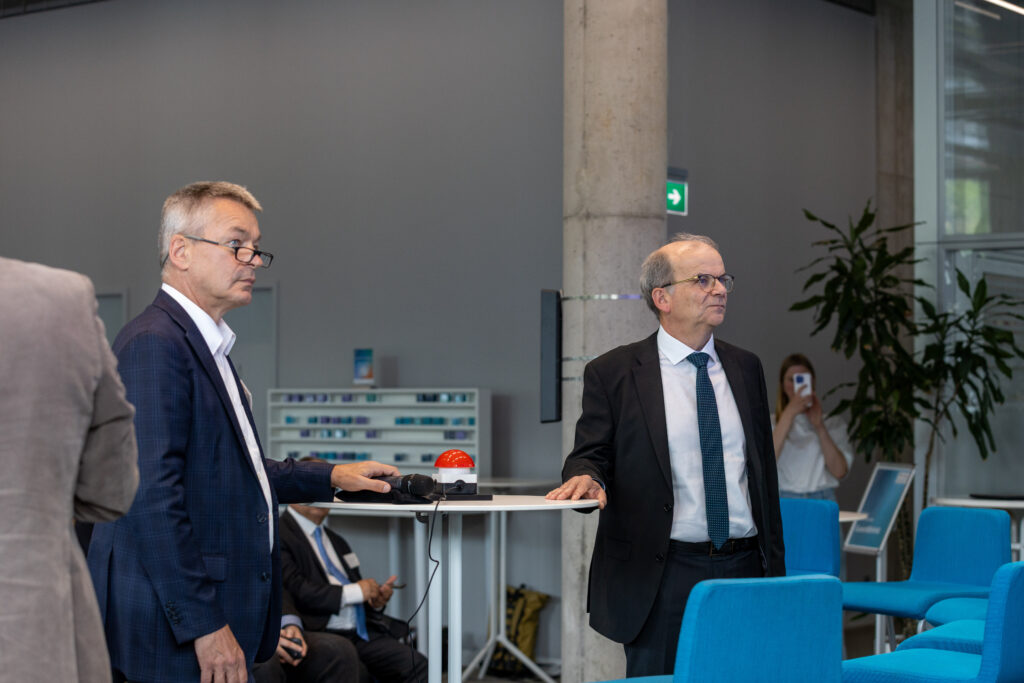
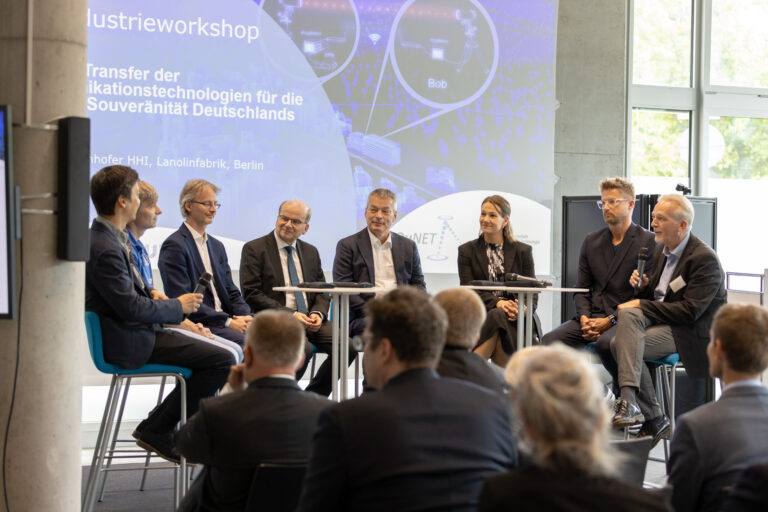
QuNET Industry Workshop on "Terrestial Quantum Networks"
Explore breakthroughs in quantum technologies for applications in terrestrial networks. This dynamic workshop brings together stakeholders from industry and academia to discuss innovations and challenges of terrestrial quantum networks.
The second Quantum Photonics Innovation Hub (QPIH) workshop on “Terrestrial Quantum Networks” provides insights into the state-of-the-art of quantum technology for terrestrial networks and serves as a platform for engaging discussions. This event is part of the QuNET Industry Workshop Series and will take place at Fraunhofer IOF in Jena on 11 September 2025 from 1 – 6 pm.
Your benefits
- Gain insights from leading experts in quantum technology for terrestrial networks and stay updated on the latest advancements.
- Network with professionals and peers, fostering collaborations and partnerships in the field.
- Enhance technical knowledge and skills applicable to current and future projects in quantum technology and networks.
- Explore potential funding opportunities and resources for research and development in quantum communication initiatives.
Target group
- Researchers and scientists in the fields of quantum physics and quantum system engineering.
- Industry professionals and entrepreneurs looking to explore applications of quantum technology for communication and integration into terrestrial networks.
The latest information and the link to the Quantum Photonics Innovation Hub (QPIH) website can be found here or by using the QR code.
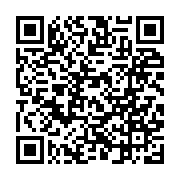
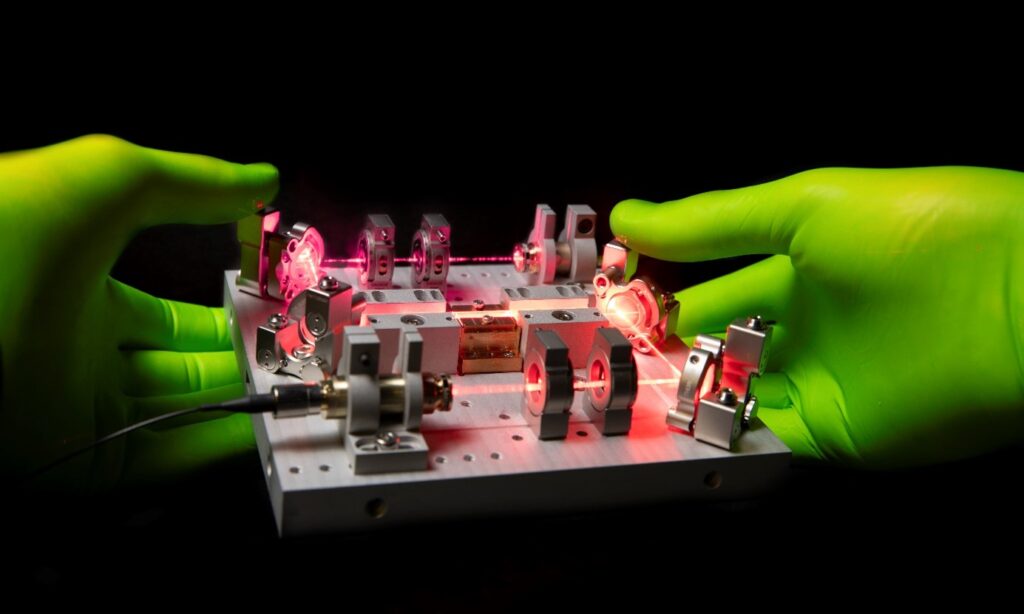
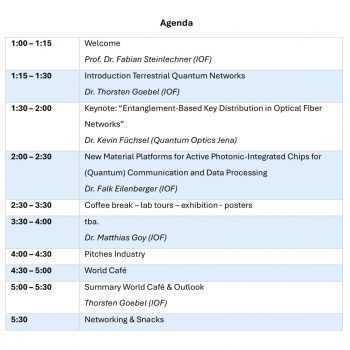
Industry workshop of the QuNET initiative on "Transfer of Quantum Communication Technologies"
As part of an industry workshop of the QuNET initiative on the transfer of quantum communication technologies for Germany’s technological sovereignty, Fraunhofer HHI invites you to attend on 11 June 2025.
Further details can be found here:
Title: Transfer of quantum communication technologies for Germany’s technological sovereignty
When: 11 June 2025, 1-6 p.m.
Where: Fraunhofer HHI, Lanolinfabrik, Salzufer 15-16, 10587 Berlin
Planned content:
- Live demonstration from the QuNET ecosystem (core project and industry-led QuNET+ projects)
- Panel discussion followed by Q&A on three key questions with all participants
- Industry exhibition with exhibits / kiosks / posters
- Industry slam for future research and transfer collaborations (à 90s) with World Café
- Extensive networking opportunities
There is the opportunity to actively shape and participate in the workshop:
Opportunities to actively shape the workshop
- Kiosk
- Exhibit
- Poster
- Industry slam for future research and transfer collaborations (à 90s): Present your company’s point of view in a 90-second pitch that considers the following questions:
- Who are we?
- What do we offer?
- What do we need to realise future prospects?
- In the subsequent World Café, we will address your concerns from the industry slam
In the subsequent World Café, we will address your concerns from the Industrieslam
You can use the following link to register by 2 June 2025, 8 a.m. and specify the activities with which you would like to participate in the event: Industry workshop of the QuNET initiative for future applications
We look forward to your participation and a successful event!
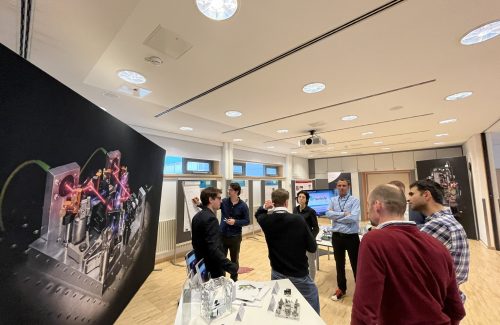

Fraunhofer IOF and QuNET at Quantum Photonics 2025: A milestone for quantum communication
Fraunhofer IOF and QuNET at Quantum Photonics 2025: A milestone for quantum communication
From 13 to 14 May 2025, the Fraunhofer Institute for Applied Optics and Precision Engineering (IOF) and the QuNET initiative presented pioneering developments in the field of quantum communication at Quantum Photonics 2025 in Erfurt. The event brought together top international researchers, industry players and decision-makers to discuss the latest advances in quantum and photonics technologies.
Dr Fabian Steinlechner, head of the ‘Photonic Quantum Systems’ department at Fraunhofer IOF, emphasised: ‘The future is quantum.’ This was impressively emphasised by the presentations and discussions at the trade fair. Fraunhofer IOF presented groundbreaking research results in quantum optics and contributed to the event with several panel contributions as well as a keynote speech by Dr Sebastian Schmitt on the topic of ‘Chip-Scale Quantum Optics: Overcoming Material Challenges to Unlock Market Potential’.
At the same time, the QuNET initiative presented its work on quantum-safe communication. Researchers from the QuNET consortium discussed current research topics, technological requirements and concrete future scenarios for secure quantum communication networks. Dr Steinlechner explained: ‘QuNET once again served as a valuable forum for interdisciplinary exchange between industry and experts from the QuNET core consortium.’
Quantum Photonics 2025 sent out a strong signal in favour of the importance of quantum and photonics technologies and their integration into the digital future. The event provided a platform for the exchange of knowledge and experience that is essential for the further development of secure communication systems.
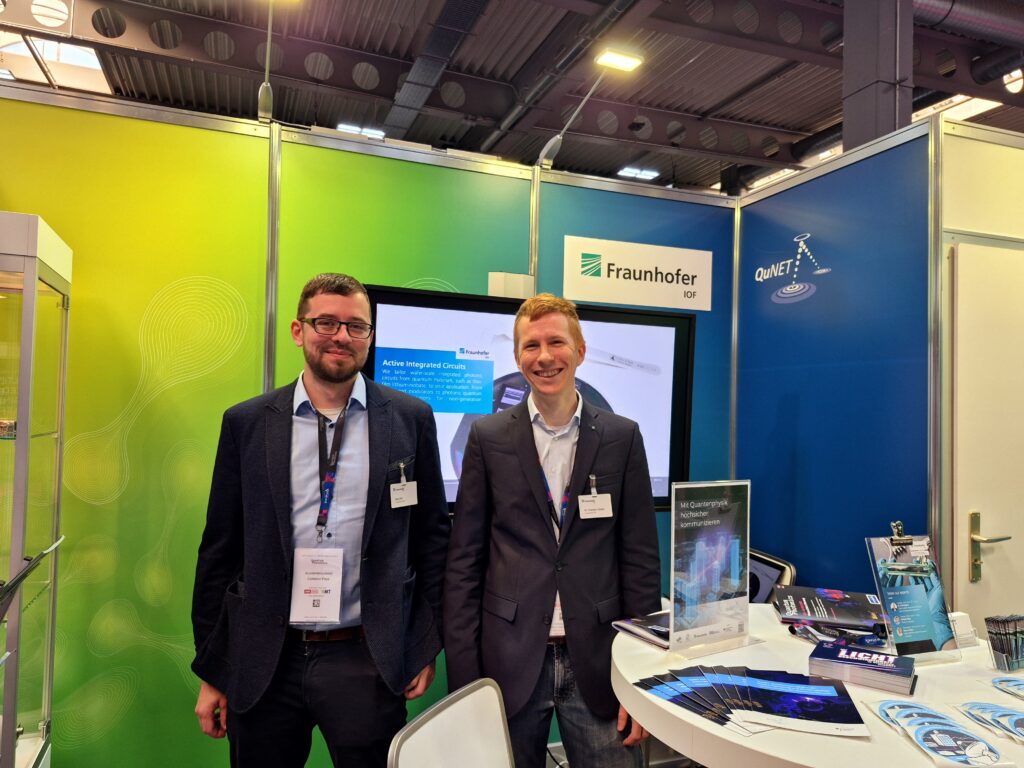
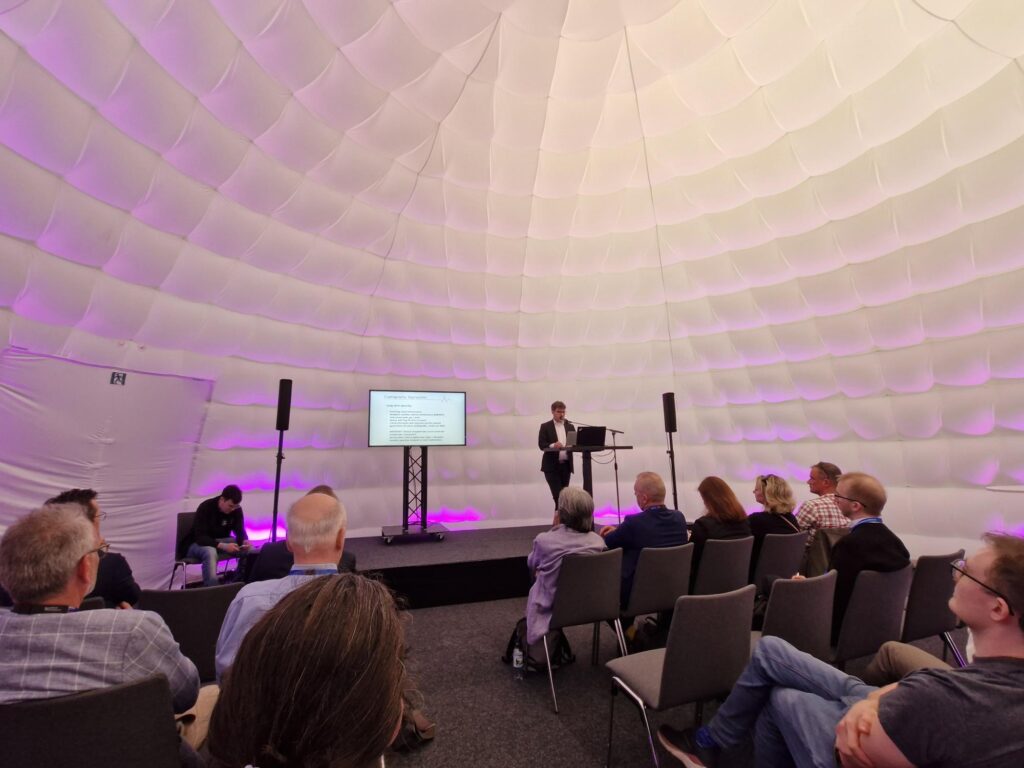
QuNET initiative: progress in quantum communication - successful tests and planning of the next key experiment
As part of the QuNET initiative funded by the Bundesministerium für Forschung, Technologie und Raumfahrt (BMFTR), researchers have made significant progress in quantum communication. Recently, the second flight campaign of key experiment 3 was carried out at the core project partner DLR-IKN, in which quantum keys were successfully exchanged between two points under everyday conditions. Both free beam and fibre connections were used to bridge fibre gaps. The experiment achieved key transmission rates in the kilobit per second range in daylight and demonstrated the feasibility of realising scalable quantum-safe networks.
As a follow-up to this, a specialist group meeting of the QuNET initiative was held at DLR-IKN in Oberpfaffenhofen on 6 and 7 March 2025. Representatives of the core institutes and the 12 industry-led QuNET+ projects intensively discussed the preparations for the fourth key experiment, which is planned for 2026. The focus was on integrating the results of the individual projects and jointly demonstrating progress.
The QuNET initiative is committed to laying the foundations for secure digital communication of the future by utilising quantum technologies for key distribution. The results so far show promising approaches for the development of highly secure communication systems.
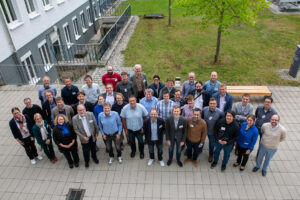
Pre-school children discover the world of optics and quantum communication
The pre-school children from the Beutenberg daycare centre recently visited the Fraunhofer Institute for Applied Optics and Precision Engineering IOF in Jena. There, the young guests were able to gain exciting insights into the QuNET research project and the fascinating world of optics.
The children were welcomed by employees Stefan Riehemann, Lisa Schindowski and Thorsten Goebel, who opened the visit with a child-orientated introduction and an interactive question and answer session under the motto ‘What do you see?’. This was followed by a number of hands-on stations, which were fun and educational. The stations were organised in such a way that complex quantum communication topics were made accessible and tangible for children. For example, the children learned how colours influence our vision, how distorted mirror images – so-called anamorphoses – appear upright again and how perspectives can deceive our perception of size.
These experiments also served as simplified models for real challenges in research: for example, the station with reflective, curved mirrors showed why non-spherical surfaces must be taken into account in free-beam communication. Colour-selective vision was used to explain how certain wavelengths of light can be filtered out – a technique that is used in quantum communication, for example, to encode and decode information.
The children were very enthusiastic – as was the positive feedback from the accompanying teachers. We are delighted that we were able to give these young researchers an exciting insight into our work and say: We look forward to seeing you again next year!
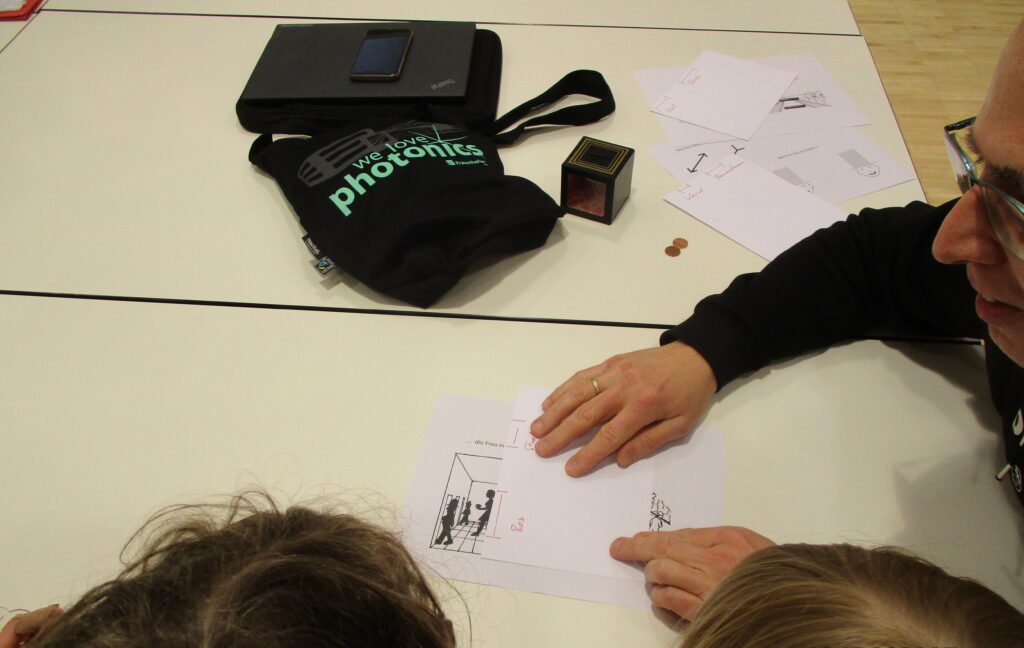
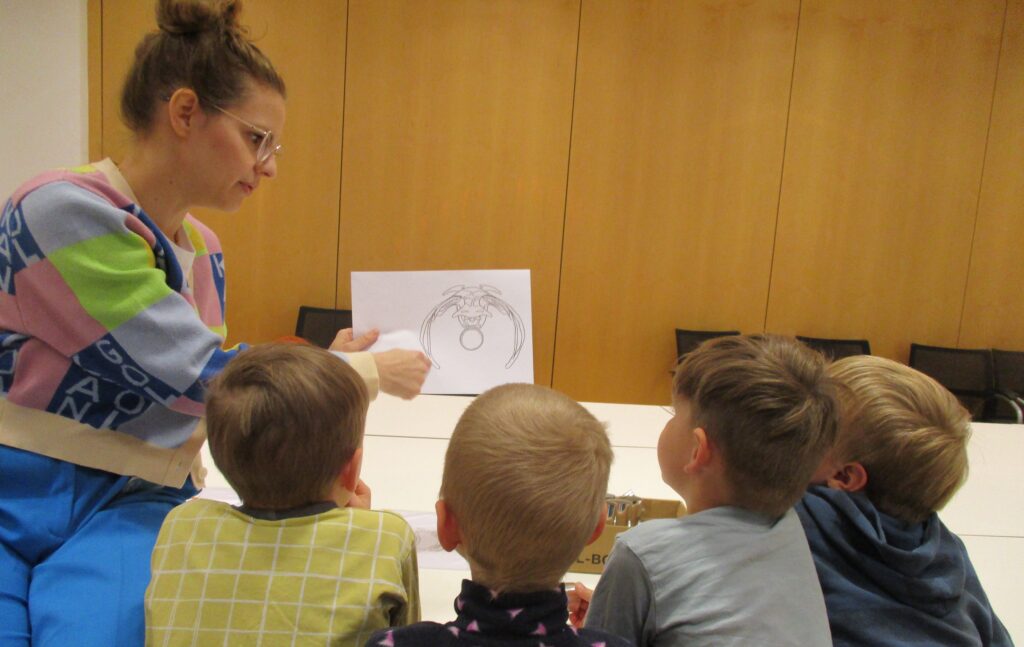
Innovations in Quantum Research: New Advances in QuBUS and QuNET
Last week, DLR’s DO 228 CFFU research aircraft took off again – with a very special goal. Together with the Max Planck Institute (MPL), the Fraunhofer HHI, the Friedrich Alexander University and the Fraunhofer IOF, quantum connections between air and ground stations were tested using the QuBUS.
The QuBUS is currently located at the Max Planck Institute in Erlangen, where it is coupled with a high-precision ion trap. This technology is used to manipulate quantum bits (qubits) with exceptional stability. This development could form the basis for future quantum computers and is an important step on the way to powerful and stable quantum computers. In parallel, QuNET contributes to the development of a secure and efficient quantum communication system. This technology enables the networking of quantum computers and is a key technology for the quantum internet, which allows the secure exchange of quantum information over long distances.
The experimental flights were successfully completed on 6 April 2025 and in the final measurement campaign next autumn, a quantum state transmitted through the air will be directly entangled with the aforementioned ion trap for the first time – a visionary step on the way to secure quantum communication over long distances.
The future of quantum research is and will remain exciting – and thanks to the ongoing collaboration, the way has already been paved for ground-breaking innovations.
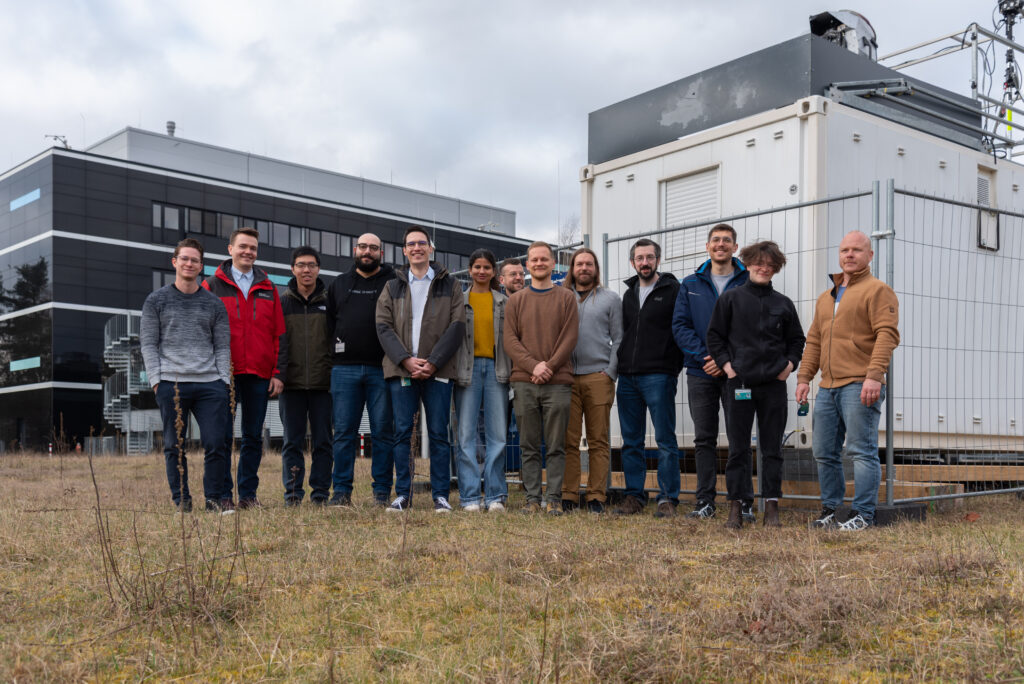
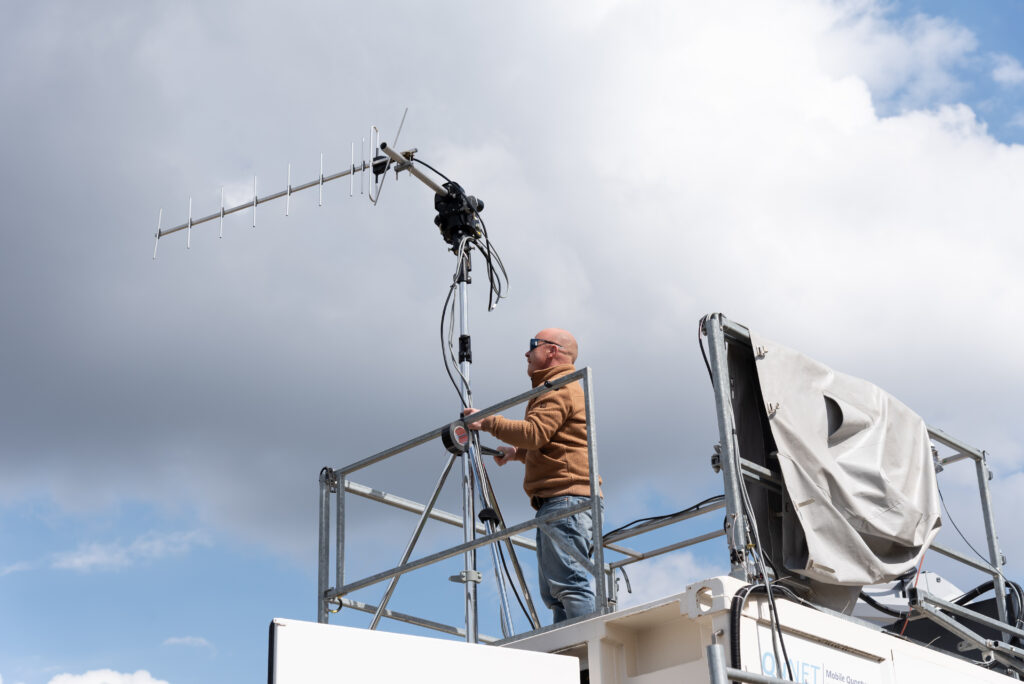
National Conference IT Security Research 2025 - Cybersecurity and Democracy
From 17 to 19 March, the Federal Ministry of Education and Research (BMBF) hosted the National Conference on IT Security Research in Berlin. The programme included a diverse range of presentations and panel discussions that provided an insight into current research projects. In addition, numerous networking opportunities offered participants the opportunity to exchange ideas with representatives from the fields of science, business and civil society, among others.
On the evening before the conference, 17 March, an ‘inventive spirit slam’ took place under the title ‘Innovations for a secure digital society’. Dr Michael Ullrich, consortium leader of the QuNET+MOBIXHAP project, took part with the topic ‘Secret communication with high-speed quantum slingers in the stratosphere’.
In addition to a dedicated QuNET stand with exhibits, the initiative was also involved in a parallel session organised by Dr habil. Torsten Siebert (IOF) chaired. After a presentation of the QuNET initiative, QuNET project manager Professor Andreas Tünnermann (IOF) took part in the discussion on stage with other colleagues from research, science and industry.
The conference covered a number of key topics, including the impact of artificial intelligence (AI) on IT security, the rise of AI-based disinformation, human-centred IT security, digital freedom and privacy and IT security in the quantum age. The aim of the event was to discuss current research policy impulses, stimulate interdisciplinary networking and provide insights into this highly dynamic field of research for all interested parties.
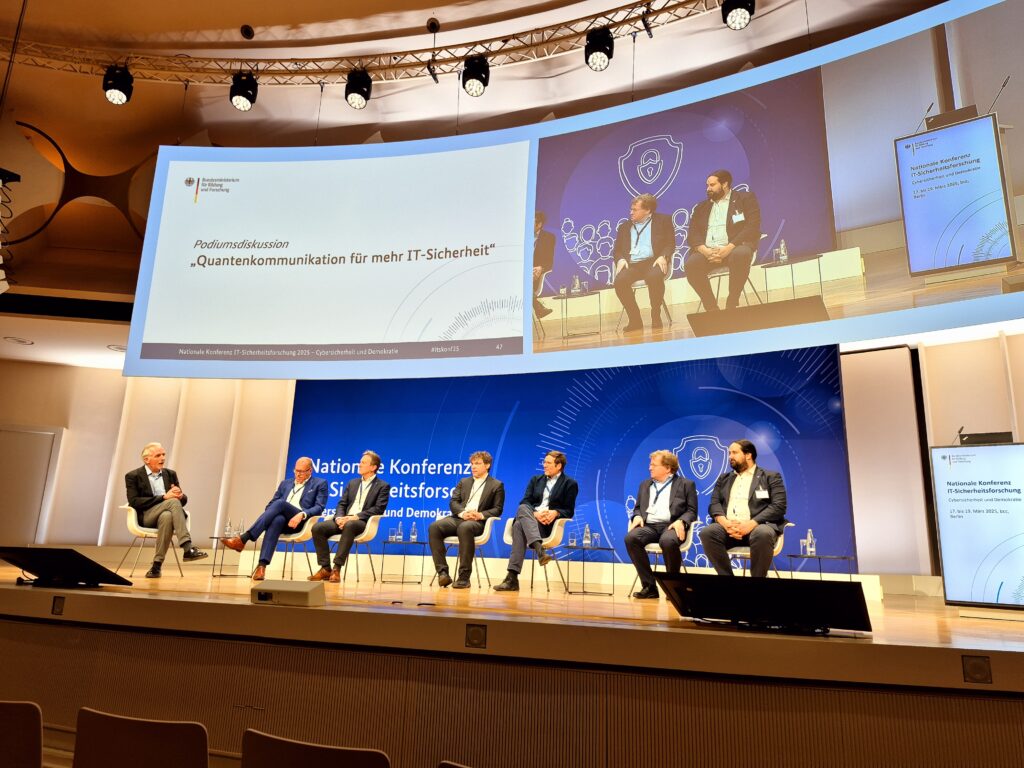
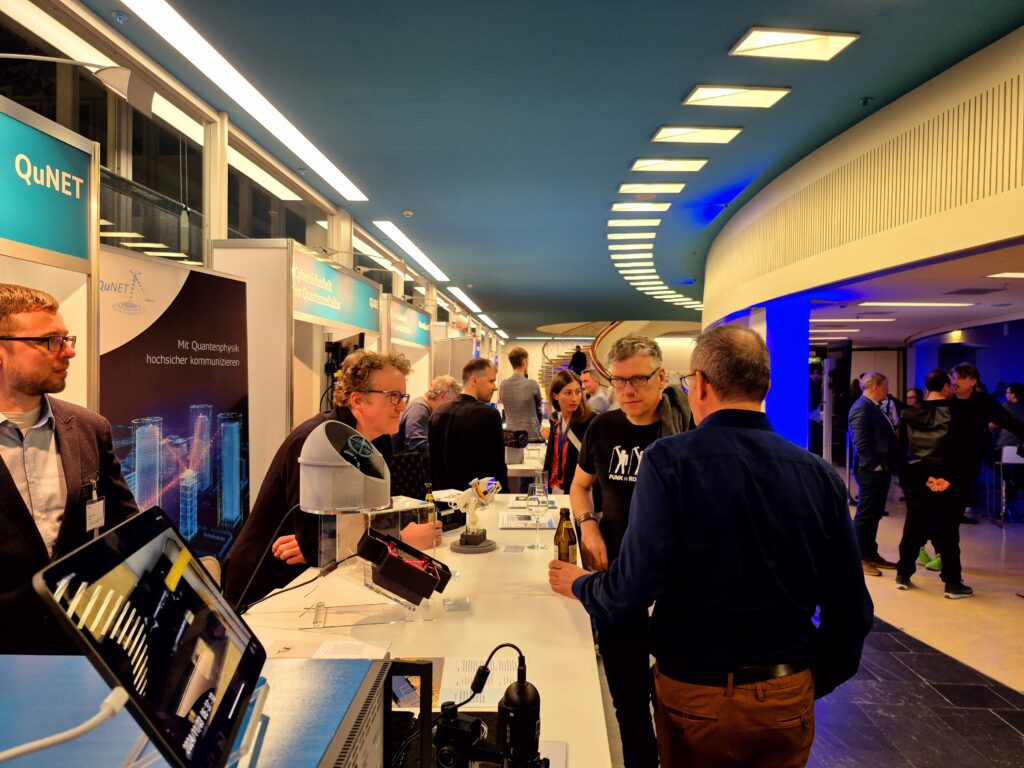
Recap of the first QPIH workshop: Quantum Space Technology Workshop
The first workshop of the Quantum Photonics Innovation Hub QPIH on quantum space technology took place at the Fraunhofer IOF in Jena on 13 March. In collaboration with QuNET and the Thuringian Innovation Centre for Quantum Optics and Sensor Technology (InQuoSens), the event served as a platform for research/science and industry to discuss the current state of quantum technology for space applications.
The event kicked off with a welcome address by Institute Director Professor Andreas Tünnermann, followed by an overview of quantum space IT technologies by Professor Fabian Steinlechner (IOF/FSU). In his keynote speech, Professor Thomas Jennewein from the University of Waterloo addressed the application of photonic quantum technologies in space using the example of the ‘QEYSSat’ project. Further insights were provided by Dr Erik Beckert and Dr Nils Heidler, among others. A poster session and pitches from industry representatives in attendance promoted dialogue between participants. The event also provided an exclusive lab tour to take a look behind the scenes of quantum research. Finally, a World Café was held as part of the workshop, during which the participants had eight minutes each to brainstorm and exchange ideas in small groups. The individual discussions took place under the following topics: ‘Space’, ‘Photonic Technology’ and ‘Ground’.
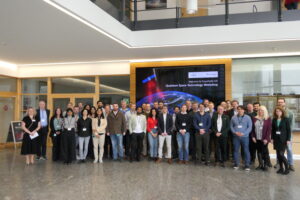
Quantum Photonics 2025: The future of quantum and photonics technologies
Quantum Photonics 2025, which will take place for the first time from 13 to 14 May 2025 in Erfurt, promises to be a major international event for quantum and photonics technologies. The event combines a conference, trade exhibition and networking and will provide an important meeting place for experts, researchers and companies from the industry. Thuringia, as an outstanding location for quantum research and development, which plays a central role in promoting these technologies, deserves special mention. The QuNET project supports Quantum Photonics, as do other regional organisations.
The congress programme has been finalised and features, among other things, a high-calibre advisory board that will shape the event with its expert knowledge. Participants can look forward to a variety of topics such as quantum communication, quantum computing and quantum sensor technology. A highlight of the congress is the opening keynote by Prof Dr Jaw-Shen Tsai from the Tokyo University of Science.
Prof Dr Andreas Tünnermann, Director of Fraunhofer IOF, Chairholder and Professor at the Institute of Applied Physics in Jena, will open Quantum Photonics this year: ‘Quantum Photonics 2025 sends out a strong signal for Thuringia as a centre of business and innovation. The regional innovation ecosystem in Thuringia, consisting of Thuringian research institutions and companies, enables research and development on photonic quantum systems at the highest level,’ says Tünnermann about the upcoming congress.
The focus is on the question of how quantum technologies can make our lives safer, healthier and more efficient in the future. The international demand for this first-time realisation of the congress in the Free State of Thuringia is particularly evident: We are asking the right questions with our research in Thuringia.
A detailed programme as well as specific times and further details can be found on the Quantum Photonics website.
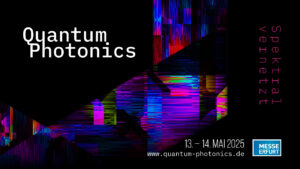
Quantum Space Technology Workshop - Part of the QuNET Industry Workshop Series
Welcome to the Quantum Photonics Innovation Hub, a bi-annual series at the interface between industry and academia and part of the ‘QuNET industry workshop series.’
The workshop features exciting poster sessions and invited talks showcasing cutting-edge technologies, visionary solutions and the latest breakthroughs in photonic quantum systems. This series explores the transformative potential of satellite and terrestrial quantum communication, computation and sensing with specific topics for each workshop.
Join this event in Jena to help shape the future of quantum technology!
Date: 13 March 2025, 1 – 6 pm
Location: Fraunhofer IOF, Albert-Einstein-Str. 7, 07745 Jena
You can find more information on our website.
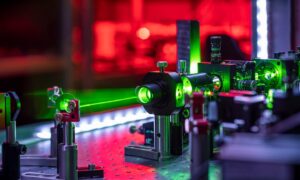
QuNET: Laser-optical communication channel between aircraft and ground station
In October 2024, researchers successfully established a laser-optical link between the DLR research aircraft DO 228 CFFU and the Fraunhofer IOF’s mobile ground station QuBUS. The aircraft generated laser beams with different wavelengths, which were received and processed by the ground station. The tests showed that a stable channel for the transmission of light particles can be aligned independently.
The aim for 2025 is to couple light particles transmitted through the air with an ion trap. The aim is to guide light particles into a glass fibre that leads to ytterbium ions. In this way, flying light particles could be transmitted into stationary quantum memories – a milestone for mobile quantum communication nodes. At the same time, quantum cryptographic systems are being tested.
You can find more information about the current experiment here: Link
